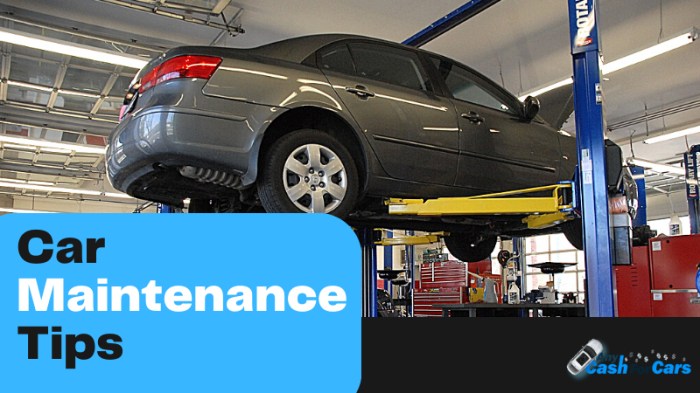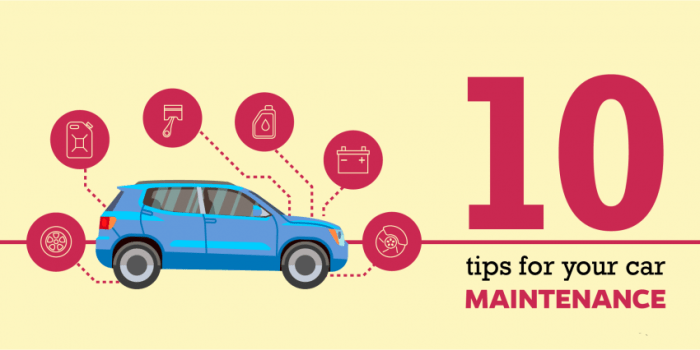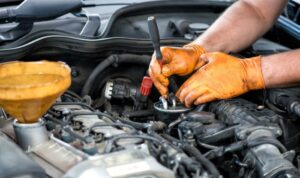Car maintenance tips are essential to ensure your vehicle stays in top shape for the long haul. From regular tasks to DIY tips, we’ve got you covered with all you need to know.
Importance of Regular Car Maintenance: Car Maintenance Tips
Regular car maintenance is crucial for ensuring the longevity and performance of your vehicle. By staying on top of maintenance tasks, you can prevent major issues from occurring and keep your car running smoothly for years to come.
Neglecting regular maintenance can lead to a variety of problems, including decreased fuel efficiency, engine overheating, brake failure, and even complete breakdowns. These issues can not only be costly to repair but can also put your safety at risk while on the road.
By investing in regular car maintenance, you can actually save money in the long run. By catching small issues early on, you can prevent them from turning into larger, more expensive problems down the line. Additionally, a well-maintained car is more fuel-efficient, saving you money on gas in the long term.
Essential Car Maintenance Tasks

Proper car maintenance is crucial to keep your vehicle running smoothly and safely. Neglecting essential maintenance tasks can lead to costly repairs and even safety hazards on the road. Here are some common car maintenance tasks that every car owner should prioritize:
Oil Changes
Regular oil changes are vital to ensure the longevity of your engine. It is recommended to change your oil every 5,000 to 7,500 miles, depending on your vehicle and the type of oil used. Failure to change the oil can result in engine damage due to increased friction and heat.
Tire Rotations
Tire rotations should be done every 5,000 to 7,500 miles or as recommended by your vehicle’s manufacturer. Rotating tires helps promote even tread wear, prolonging the life of your tires. Neglecting tire rotations can lead to uneven wear, affecting your vehicle’s handling and fuel efficiency.
Brake Inspections
Regular brake inspections are essential for your safety on the road. It is recommended to have your brakes inspected every 12,000 miles or as advised by your mechanic. Ignoring brake inspections can result in brake failure, putting you and other road users at risk.
Remember, staying on top of these essential car maintenance tasks not only keeps your vehicle in top condition but also ensures your safety and the safety of others on the road.
DIY Car Maintenance Tips
When it comes to taking care of your ride, being able to handle some basic maintenance tasks on your own can save you time and money. Here are some essential DIY car maintenance tips to keep your vehicle in top shape.
Changing a Flat Tire
- First things first, park your car on a flat surface and engage the parking brake to ensure safety.
- Locate the spare tire, jack, and lug wrench in your vehicle.
- Loosen the lug nuts on the flat tire before raising the car with the jack.
- Remove the lug nuts and old tire, then mount the spare tire onto the wheel hub.
- Tighten the lug nuts in a star pattern and lower the car back to the ground.
- Double-check the lug nuts to ensure they are securely fastened before hitting the road.
Replacing Air Filters
- Start by locating the air filter housing under the hood of your car.
- Open the housing and remove the old air filter carefully to avoid letting debris into the engine.
- Inspect the new air filter to ensure it matches the old one in size and shape.
- Install the new air filter into the housing, making sure it is securely in place.
- Close the housing and secure any clips or screws to keep the air filter in place.
Remember, safety should always come first when performing DIY car maintenance tasks. Make sure to wear gloves and eye protection, and never work under a car supported only by a jack.
Seasonal Maintenance Checks

Seasonal maintenance checks are crucial to ensure your car is ready to handle the specific challenges presented by different weather conditions throughout the year. By performing regular maintenance tasks tailored to each season, you can optimize your car’s performance and longevity.
Winter Maintenance
- Check your antifreeze levels and ensure they are sufficient to prevent freezing.
- Inspect your tires for proper tread depth and consider switching to winter tires for better traction.
- Replace worn windshield wipers to improve visibility in snowy and icy conditions.
Summer Maintenance, Car maintenance tips
- Monitor your engine coolant levels and top up as needed to prevent overheating.
- Inspect your air conditioning system to ensure it is working efficiently during hot weather.
- Check your tire pressure regularly, as hot temperatures can affect tire performance.
Fall Maintenance
- Clean or replace your air filters to improve air quality inside the car as you drive with the windows closed.
- Inspect the battery and terminals for any signs of corrosion and ensure a secure connection.
- Check the brakes and brake fluid levels to ensure optimal stopping power as road conditions change.
Spring Maintenance
- Inspect and replace worn-out windshield wipers to handle spring showers and maintain visibility.
- Check for any damage to the undercarriage caused by winter road salt and debris.
- Test the car’s battery and charging system to ensure it is functioning properly after the cold winter months.

